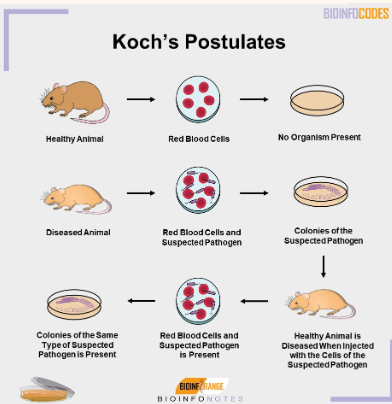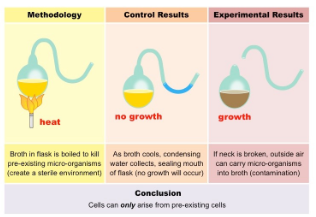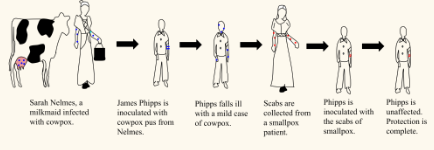Germ Theory & Human Health
1/16
Name | Mastery | Learn | Test | Matching | Spaced | Call with Kai |
|---|
No analytics yet
Send a link to your students to track their progress
17 Terms
Spontaneous Generation
An old belief that states living things were derived from non living things.
Ex. Toads were born from moist soil, birds came from clouds, maggots came from decay
What did Francisco Redi do?
He disproved spontaneous generation by testing if rotting meat produced maggots in a jar- it in fact did not.
Germ Theory
Microorganisms (pathogens or “germs”) can cause diseases and sicknesses.
Miasma Theory
An old, irrational belief in which people thought diseases were a curse by evil spirits or when a bad smelling vapor was present.
What do we know today that opposes Miasma theory?
Diseases and sicknesses can be inherited from genes or through environmental, biotic agents like bacteria, viruses, or fungi.
What were Robert Koch’s 4 postulates?
Isolate microbe
Grow in culture
Reproduce by injecting into another host
Re-isolate microbe

Robert Koch
German scientist that said bacteria caused certain diseases (germ theory)
Louis Pasteur
Discovered the cause of rabies, chicken cholera, and anthrax in sheep
Disproved spontaneous generation by performing an experiment involving boiling water that kills microorganisms and therefore concluding that cells can only arise from pre-existing cells.

Edward Jenner
Used cowpox as a vaccine for smallpox (1st vaccine).
Found that the human body was able to recognize the similar smallpox virus from its antigens (cowpox) and is able to fight it effectively

How are germs spread??? :x
Person to person
Contaminated food
Infected animals
How do we fight germs?
Treatment
Antibiotics (kills bacteria without harming cell)
Vaccines (for viral infections)
Trains body to prevent illnesses before you get them
Factors that influence human health
Environmental factors (diet, exercise, sleep, stress, drugs, etc)
Genetic factors (diseases passed down like cancer, down syndrome, diabetes, etc)
How do we reduce pathogen exposure?
Use good sanitation practices
Handle food safely
Keep water clean
Use gloves and masks
Why do antibiotics sometimes not work?
Bacteria can sometimes adapt and change to the antibiotic
Why do we get vaccines annually?
Viruses can mutate rapidly, and are very tolerant of change. They can evolve to avoid human immunity while still having the main functions for viral replication.
Why can’t antibiotics work on viruses?
Because they are caused by viruses not bacteria, hence “anti-biotics”.
How can bacteria be beneficial?
Some bacteria aid digestion, protect our teeth, defend our skin, fights off microbes, protect against diseases like asthma or cancer, prevent gum disease, and prevents tooth decay.